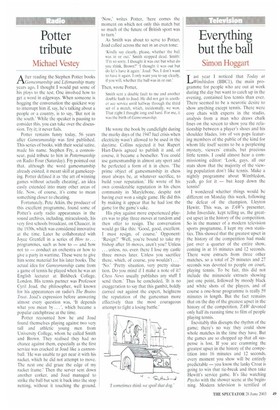Potter tribute
Michael Vestey
A fter reading the Stephen Potter books 1-1.Gamesmanship and Lifemanship many years ago, I thought I would put some of his ploys to the test. One involved how to get a word in edgeways. When someone is hogging the conversation the quickest way to interrupt him if, say, he's talking about a people or a country, is to say, 'But not in the south.' While the speaker is pausing to consider this, you can take over the discussion. Try it; it never fails.
Potter remains funny today, 56 years after Gamesmanship was first published. This series of books, with their social satire, made his name. Stephen Fly, a connoisseur, paid tribute to him in Pottemanship on Radio Four (Saturday). Fry pointed out that. although the word gamesmanship already existed, it meant skill at gamekeeping. Potter defined it as the art of winning games without actually cheating', an idea easily extended into many other areas of life. Now, of course, it's come to mean something closer to cheating.
Fortunately, Pete Atkin, the producer of this excellent programme, found some of Potter's early radio appearances in the sound archives, including, miraculously, his very first schools broadcast, on Chaucer, in the 1930s, which was considered innovative at the time. Later he collaborated with Joyce Grenfell in a series of How to. programmes, such as how to — and how not to — conduct an orchestra or how to give a party in wartime. These were to give him some material for his later books. The actual idea for Gamesmanship came from a game of tennis he played when he was an English lecturer at Birkbeck College, London. His tennis partner was Professor Cyril Joad, the philosopher, well known for his appearances on radio's The Brains Trust. Joad's expression before answering almost every question was, 'It depends what you mean by ... which became a popular catchphrase at the time.
Potter recounted how he and Joad found themselves playing against two very tall and athletic young men from University College, whom he called Smith and Brown. They realised they had no chance against them, especially as the first service was cracked at Joad like a cannonball. 'He was unable to get near it with his racket, which he did not attempt to move. The next one did graze the edge of my racket frame.' Then the server sent down another corker, and Joad managed to strike the ball but sent it back into the stop netting, without it touching the ground. 'Now,' writes Potter, 'here comes the moment on which not only this match but so much of the future of British sport was to turn.'
As Smith was about to serve to Potter, load called across the net in an even tone:
'Kindly say clearly, please, whether the ball was in or out.' Smith stopped dead. Smith: 'I'm so sorry. I thought it was out but what do you think, Brown?' I thought it was out but do let's have it again.' Joad: 'No, I don't want to have it again. I only want you to say clearly, if you will, whether the ball was in or out,'
Then, wrote Potter,
Smith sent a double fault to me and another double fault to Joad. He did not get in another ace service until halfway through the third set of a match, which, incidentally, we won. That night I thought long and hard. For me, it was the birth of Gamesmanship.
He wrote the book by candlelight during the murky days of the 1947 fuel crisis when electricity wasn't allowed to be used in the daytime. Collins rejected it but Rupert Hart-Davis agreed to publish it and, of course, it became a bestseller. You could use gamesmanship in almost any sport and he perfected a form of it in chess. 'The prime object of gamesmanship in chess must always be, at whatever sacrifice, to build your reputation.' He wrote of his own considerable reputation in his chess community in Marylebone, despite not having ever won a single game. He did this by making it appear that he had lost the game for the game's sake.
His ploy against more experienced players was to play three moves at random and then offer to resign. The conversation would go like this: 'Good, good, excellent. I must resign, of course.' Opponent: 'Resign?"Well, you're bound to take my bishop after 16 moves, aren't you? Unless ... unless, no, even there I lose my castle three moves later. Unless you sacrifice there, which, of course, you wouldn't ' 'No.' 'Pretty situation, very pretty situation. Do you mind if I make a note of it? Chess News usually publishes any stuff I send them.' Thus he concluded, 'It is no exaggeration to say that this gambit, boldly carried out against the expert, heightens the reputation of the gamesman more effectively than the most courageous attempt to fight a losing battle.'


































































 Previous page
Previous page